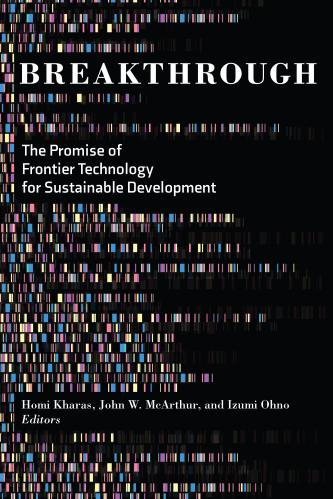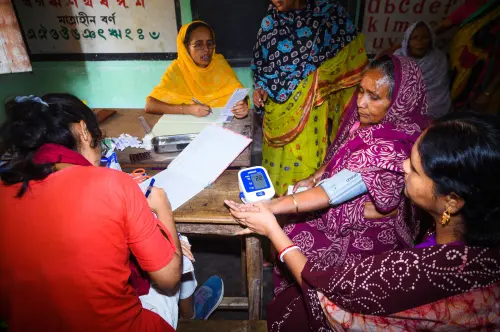Food security is an important goal for Indonesia, and since the introduction of the Food Law of 2012, the country has made good progress in staple food production. However, a World Bank report pointed out that overall food security performance—i.e., the availability, affordability, and (nutritional) quality of food—is mixed. To date, food security policies have aimed at improving availability; going forward, the policy focus should shift to enhancing affordability and nutritional quality. The COVID-19 crisis has highlighted weaknesses of the agri-food system in the country, but it also brings an unprecedented opportunity to transform the system.
The traditional agriculture sector in emerging markets is being transformed by digital technologies and can be viewed from the lean startup lens—“think big, act fast, start small”. I delved deeper into Indonesia in my chapter in the recent book Breakthrough: The Promise of Frontier Technology for Sustainable Development. “AgriTech” uses digital technology to improve agricultural yields and profitability for smallholder farmers.
Emerging markets such as Indonesia are developing a dynamic and vibrant AgriTech ecosystem in five key business models—farmers advisory, peer-to-peer lending, traceability, digital marketplaces, and mechanization. Increased investment in agriculture to modernize food systems and make them more efficient is key to improving the country’s food production. This will also enable smallholder farmers to improve productivity and earn more income.
Facilitating and Promoting Agriculture Digital Transformation to Drive Food Security
Agriculture is the least digitized sector in Indonesia, and as a result, productivity gains and development opportunities are left untapped. The digital transformation of agriculture involves the adoption of digital technologies such as mobile/internet connectivity, artificial intelligence (AI), machine learning (ML), cloud computing, the Internet of Things (IoT), and blockchain/Distributed Ledger Technology (DLT) to enable new business models that can help improve agricultural yields, efficiency, incomes, and profitability. Moreover, it will require an innovation culture mindset shift to attract a new generation of farmers and entrepreneurs. To operationalize and take full advantage, a “digital agriculture ecosystem” must be developed, which includes:
- Digital infrastructure, such as agriculture data (e.g., farmer registries, soil maps, weather, agronomy, pest and disease surveillance); digital hardware (e.g., drone technology, satellite/GIS, sensors, soil diagnostic tools); and digital software (e.g., data capture tools, field agent management tools, blockchain platforms)
- Digital application areas, such as:
- Advisory services: dissemination of information to improve farming techniques and promote new technology
- Market linkages: facilitating sales between farmers and buyers
- Financial access: provision of finance to increase farm productivity or profitability
- Supply chain management: tracking and managing supply chains to improve profitability through certification and traceability
- Macro agri-intelligence: generating and/or disseminating macro data to stakeholders
To develop the digital agriculture ecosystem, three critical factors are needed: data, innovation, and partnerships between multiple stakeholders in the public and private sectors. The agriculture digital transformation will leverage institutional innovation to foster crossfertilization of knowledge and productive partnerships, catalyzing data sharing, and the experimentation and testing of disruptive technologies. It will scale proven solutions through national-level engagements for an efficient, equitable, and environmentally sustainable food system.
The digital transformation of the agriculture sector in other emerging markets can provide key lessons that Indonesia can adapt to its local context. Traditional ways of bridging the yield gaps—for example, by applying more fertilizer and pesticides and teaching farmers good agricultural practices—are not sufficient. A transformation in agriculture is needed where data can lead to better, timely, and actionable knowledge. The influence of weather, soil, crop reaction to conditions, and small production plots make it difficult to develop universal solutions.
How Indonesia is Digitally Transforming the Agriculture Sector
Technology can be a driver of continuous growth. However, examples of digital agriculture public-private partnerships in Indonesia are still limited. Hence, building strategic partnerships with private businesses, in the form of an “Innovation Hub”, can use data to unlock the full potential of technology-enabled transformation in agriculture.
There are four key characteristics of an Innovation Hub that would be essential to offer a positive environment for the development and growth of AgriTech startups and encourage the adoption of digital technologies across the agriculture value chain:
- Cross-sector development: The linkage from AgriTech to FinTech platform by developing financing products that are well-suited for farmers’ production cycle and by connecting AgriTech with commercial banks for additional sources of funding for lending to farmers.
- Importance of strategic partnerships: AgriTech startups have expanded the network of farmers by engaging with new agribusiness partners such as government and business-to-business (B2B) relationships to work directly with farmers. They have also expanded last-mile connections to customers in the supply chain and logistics covering the first mile, mid mile, and last mile.
- Building resilience post-COVID-19 to address risk and challenges: Strengthening the firm’s risk management platform while helping smallholder farmers such as the contactless transaction and the use of technology such as using IoT sensors to measure crop yields.
- Capacity Building and Innovation: Introducing climate-smart agriculture to smallholder farmers to encourage sustainable agricultural practices in growing more food at lower cost through innovative practices that produce higher quality crops at, and addressing high-cost items such as efficient use of fertilizers and irrigation for the types of soil.
Various AgriTech business models have emerged globally to address the main challenges smallholder farmers face. Indonesia is an example of what developing countries can hope to achieve. The AgriTech startups are already making inroads in shaping the agriculture value chain in Indonesia, much in the same way that Fintechs are transforming the financial services sector. Investing in Data and Innovation ecosystems could attract more young innovators in agriculture.
Together with enabling regulations and increased investments in infrastructure, digital technologies will be the key enabler to address food security, reduction in food wastage, sustainable farming, and climate crisis. The establishment of the Innovation Hub in Indonesia could bring together multiple stakeholders in the agriculture value chain to share data, foster innovation, provide investment, mentoring, and capacity building for young startups. The hub’s success will be dependent on building partnerships between the public and private sector and making sure that regulations can foster innovation while mitigating potential risks. More technological innovation in agriculture is needed today. This is a global challenge and the time to act is now. In the spirit of the lean startup mindset: Let’s think big, start small and act fast.
The Brookings Institution is committed to quality, independence, and impact.
We are supported by a diverse array of funders. In line with our values and policies, each Brookings publication represents the sole views of its author(s).







Commentary
The digital transformation of agriculture in Indonesia
January 21, 2022